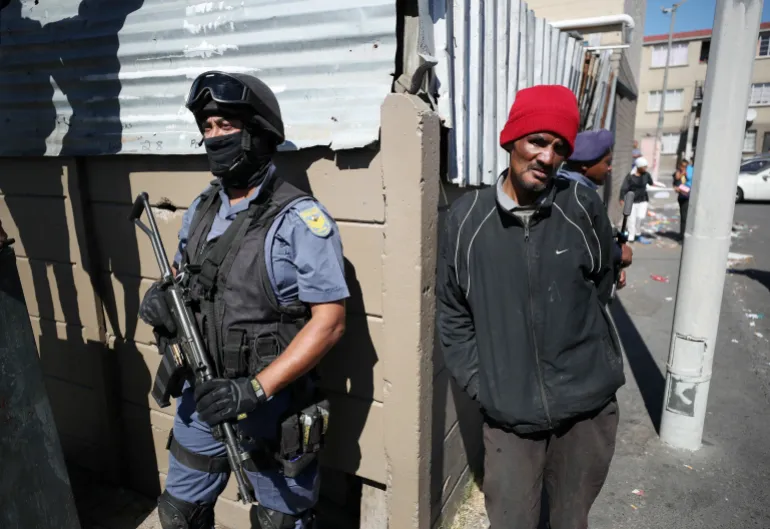South Africa’s Ramaphosa says troops will deploy to tackle crime gangs | Crime News
President Cyril Ramaphosa says the military will work with the country’s police force to counter ‘gang wars’ that threaten ‘our democracy’.
South African President Cyril Ramaphosa said he will deploy the army to work alongside the police to tackle high levels of gang violence and other crimes in the country.
Ramaphosa said on Thursday that he had directed the chiefs of the police and army to draw up a plan on where “our security forces should be deployed within the next few days in the Western Cape and in Gauteng to deal with gang violence and illegal mining”.
Recommended Stories
list of 4 itemsend of list
“Organised crime is now the most immediate threat to our democracy, our society and our economic development,” the president said in his annual state of the nation address.
“Children here in the Western Cape are caught in the crossfire of gang wars. People are chased out of their homes by illegal miners in Gauteng,” he told Parliament in his address.
“I will be deploying the South African National Defence Force to support the police,” he said.
South Africa has one of the highest homicide rates in the world, with approximately 60 deaths each day involving killings in wars between drug gangs in areas of Cape Town and mass shootings linked to illegal mining in Johannesburg’s Gauteng province.
The South African leader said other measures to fight crime include recruiting 5,500 police officers and boosting intelligence while identifying priority crime syndicates.
“The cost of crime is measured in lives that are lost and futures that are cut short. It is felt also in the sense of fear that permeates our society and in the reluctance of businesses to invest,” Ramaphosa said.

Crime syndicates
Guns are the most commonly used weapon in South Africa, according to authorities, and illegal firearms are used in many crimes, despite the stringent rules governing gun ownership in the country.
Authorities in South Africa have also long struggled to prevent gangs of miners from entering some of the 6,000 closed or abandoned mines in the gold-rich nation to search for remaining reserves.
The government claims that the miners, referred to as “zama zamas”, or “hustlers” in Zulu, are typically armed, undocumented foreign nationals who are involved in crime syndicates.
In 2024 alone, South Africa lost more than $3bn in gold to the illegal mine trade, according to authorities.
Ramaphosa also said authorities would pursue criminal charges against municipal officials who fail to deliver water to communities where shortages are among the main issues that anger most voters.
“Water outages are a symptom of a local government system that is not working,” the president said of the worsening water crisis resulting from a drying climate and consistent failures to maintain water pipes.
“We will hold to account those who neglect their responsibility to supply water to our people,” he said.
Residents of the country’s biggest city, Johannesburg, held scattered protests this week after taps had been dry in some neighbourhoods for more than 20 days.
Ramaphosa also called out “powerful nations” who exert their “dominance and influence over less powerful states” and said South Africans could not consider themselves “free” as “long as the people of Palestine, Cuba, Sudan, Western Sahara and elsewhere suffer occupation, oppression and war”.
Ramaphosa, who became head of state in 2018, has led South Africa’s first-ever coalition government since June 2024, when the ANC lost its parliamentary majority for the first time since ending apartheid 30 years earlier.
The coalition, which includes the pro-business Democratic Alliance, has helped restore confidence in Africa’s largest economy.
But widespread, persistent unemployment has not improved, and the government is under pressure to show it can improve service delivery.

